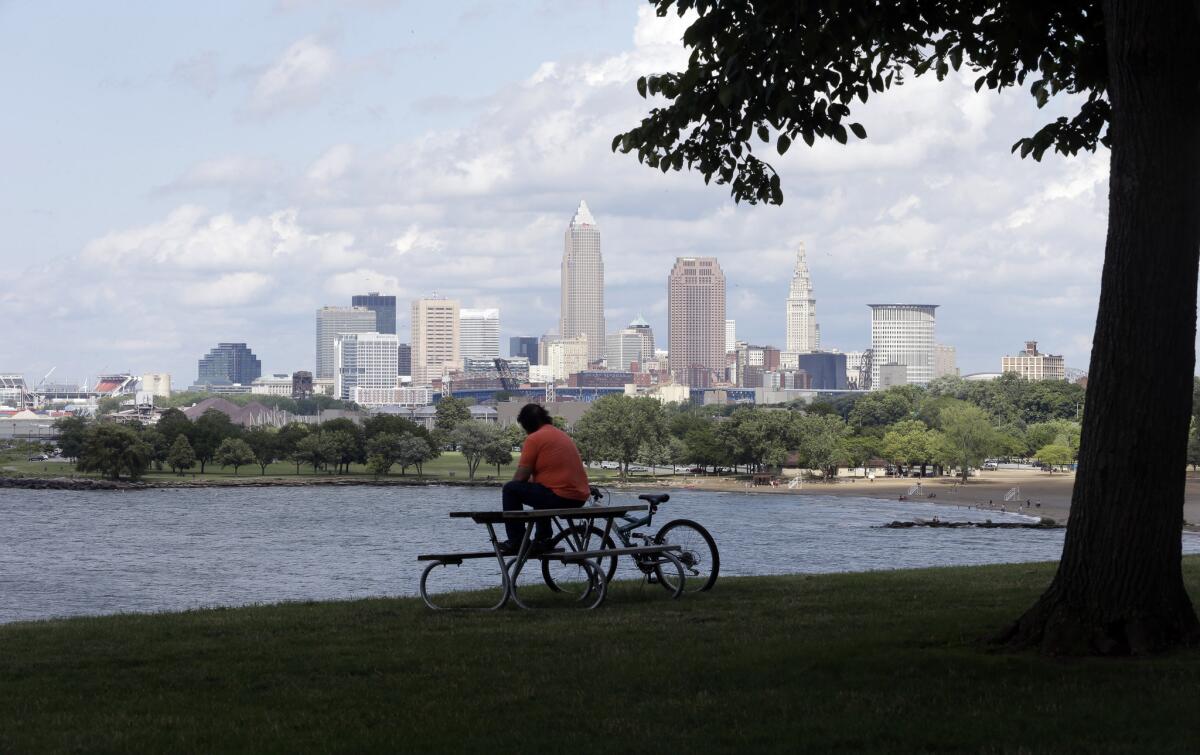Cleveland’s attempt to restrict protests outside Republican convention is unconstitutional, court rules

- Share via
Reporting from Cleveland, Ohio — Restrictions on speeches and parades outside next month’s Republican National Convention were struck down by a federal judge Thursday as unconstitutional.
At a Thursday morning hearing, U.S. District Judge James S. Gwin said he would issue a preliminary injunction forcing the city of Cleveland to rewrite its restrictions for a potentially contentious convention expected to draw up to 100,000 politicians, delegates, supporters, protesters and media.
The American Civil Liberties Union of Ohio had sued the city of Cleveland in a lawsuit that also included a liberal group, Organize Ohio, and a conservative group, Citizens for Trump, that had hoped to hold parades near the convention events in the heart of the city.
TRAIL GUIDE: All the latest news on the 2016 presidential campaign >>
The city’s regulations restricted parades to 18 separate 50-minute time slots on a single route near the convention. The city had also banned all sound amplifiers larger than bullhorns and all speaking platforms within a security zone that stretches more than three square miles within the city.
City officials argued that such items could be used to hide bombs.
The security zone is a less-restrictive area than the smaller U.S. Secret Service-protected “hard” security zone that will be immediately drawn around convention events and media filing areas. The ACLU had not contested the restrictions on the “hard” security zone in its lawsuit, and the zone does not seem to be affected by Gwin’s order.
ACLU of Ohio Legal Director Freda Levenson argued in court that the larger security zone was “a black hole for 1st Amendment activities,” adding, “The 3.5-square-mile zone doesn’t keep us safe from terrorism.”
An attorney for the city, Stewart Hastings, had countered that Cleveland’s limits for speaking platforms and parades were far less restrictive than other cities’ rules for past political conventions.
“Cleveland will be the most open convention for public speech in recent history,” Hastings argued in court, noting that protesters and others will be able to move freely within the larger security zone holding signs or using bullhorns as long as they do not block traffic.
“If they want to walk up to the fence [outside the convention], put a bullhorn to their mouths and shout at the delegates, they can do that,” Hastings said. He added: “People are allowed to protest and give their speech wherever they want.”
But after hearing the attorneys’ arguments, Gwin said the “unduly large” security zone “does not seem particularly tailored to the security issue.” The judge also said the city had not provided sufficient alternatives for parade routes and said the city had placed too many restrictions on use of local parks for demonstrations.
Gwin said he hoped the city would narrow its regulations “in some fashion” and suggested that the city work with the ACLU to redraw new limits to avoid another court battle.
Hastings declined to comment immediately after the ruling, referring questions to the city’s press office. The ACLU of Ohio’s executive director, Christine Link, told reporters, “We will make every effort to work with the city.”
Online court records showed that the judge ordered the case referred to mediation.
The order to move the case to mediation happened immediately after Thursday’s hearing ended, Link said. The judge was likely “attuned to the need to move quickly” and had signaled before the hearing that he wanted the lawsuit handled in mediation, Link said. A city spokesman has not responded to a request for comment.
ALSO
Analysis: Donald Trump crafts a potent message, but proves a weak messenger
UPDATES:
11:20: This article was updated with Link’s comments on the the mediation order.
10:29 a.m.: This article was updated throughout.
This post was originally published at 9:09 a.m.
More to Read
Sign up for Essential California
The most important California stories and recommendations in your inbox every morning.
You may occasionally receive promotional content from the Los Angeles Times.











